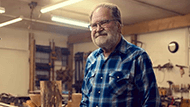Harry Rhodes – Prostate Cancer Patient Story

Harry Rhodes, 81, underwent a PET scan to investigate some suspicious findings in his lungs. However, doctors found something else concerning – prostate cancer.
Harry’s urologist referred him to UPMC Hillman Cancer Center at UPMC Washington (formerly Washington Health System Radiation Oncology, in partnership with UPMC Hillman Cancer Center) for treatment.
His health care team at first had differing opinions on whether he should undergo a hormone treatment, which is often used to supplement radiation treatment for prostate cancer. Thanks to a more than 10-year partnership between Washington Health System and UPMC Hillman Cancer Center, they were able to consult with other doctors from UPMC, and they decided to move forward with the hormone treatment as an additional safeguard to treat his cancer.
For more than a decade, the partnership has brought state-of-the-art radiation therapy, improved diagnostic capabilities, and other support services to cancer patients right in their own communities. It provides area doctors and patients local access to the latest and most advanced treatments with expert radiation oncologists.
Multidisciplinary, Expert Care
After seeing the thoughtful consideration that went into this recommendation and the collaboration among doctors, including radiation oncologists Steven Mandish, MD, and Ziad S. Fawaz, MD, MS, Harry says he was fully confident in his care team and their decisions.
His treatment plan included the placement of fiducial markers, which are tiny metal objects about the size of a grain of rice. They are placed in the prostate to provide a target for the provider to line up the beams of radiation – ensuring the treatment is highly focused on the tumor and helping avoid affecting healthy tissue. It also acts as a blueprint so that each radiation treatment is delivered the same way each time. The fiducial markers can remain in the patient’s body for the rest of their life with no risk to their health.
Harry also received external radiation treatments five days a week for five and a half weeks for a total of 28 treatments. Technological advancements in radiation oncology have reduced the length of treatments for patients. In Harry’s case, the standard would have been nine weeks.
 Despite the daily two-hour round-trip commute required to get to his treatments from his home in Deep Valley, Pa., a small town close to the West Virginia border, Harry says it was much more convenient than driving daily to Pittsburgh.
Despite the daily two-hour round-trip commute required to get to his treatments from his home in Deep Valley, Pa., a small town close to the West Virginia border, Harry says it was much more convenient than driving daily to Pittsburgh.
“If I would have had to go to Pittsburgh, I wouldn’t have gotten the treatment,” he says.
Cancer Free
 Today, Harry is cancer free. He continues to walk three miles per day, which he did even during treatment. He praises his team of doctors and nurses, commending them on going above and beyond to make his treatments as comfortable as possible and helping to answer all of his questions.
Today, Harry is cancer free. He continues to walk three miles per day, which he did even during treatment. He praises his team of doctors and nurses, commending them on going above and beyond to make his treatments as comfortable as possible and helping to answer all of his questions.
Harry also credits the success of his treatment to the expertise of his doctor and the collaboration of other medical experts. The partnership between Washington Health System and UPMC allowed doctors to determine the best course of treatment resulting in the best outcome, close to home.
Harry and wife Pam own a woodworking business where they create a variety of projects from furniture to beautiful hand-crafted wooden bowls and have shipped them as far as Rome. Harry looks forward to many more years of using his creative gifts and perfecting his woodworking with Pam.

